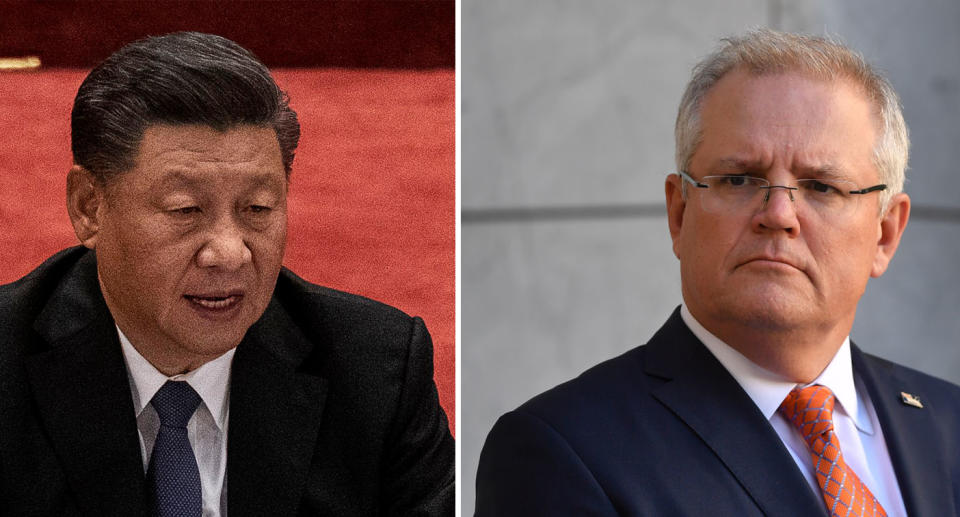Why Australia's latest move is set to enrage China further
New legislation allowing the federal government to veto foreign deals at state level is set to become the latest triggering sanction amid the deteriorating relationship between Australia and China.
Beijing and Canberra have clashed on a series of issues since Prime Minister Scott Morrison made an early call for an independent investigation into the origins of the coronavirus pandemic.
The relationship hit a new low last week as China reacted angrily to Prime Minister Scott Morrison’s response to a provocative artwork of an Australian soldier slitting the throat of an Afghan child.
China’s Deputy Head of Mission in Australia Wang Xining on Friday reiterated calls of Chinese officials for major concessions from the Morrison government if the relationship has any chance of being saved.
Mr Wang called for “concrete actions” from the federal government.

Beijing is likely seeking for Canberra to back down on a series of issues detailed in two lists, an 11-point list plastered across Chinese state media in July and a 14-point dossier passed to Nine Newspapers last month.
Among China’s concerns was the blocking of Chinese foreign investment deals.
However, legislation permitting the Australian government to review and scrap state, territory, local council and public university deals with other nations on Tuesday passed federal parliament.
The move is set to antagonise China further, who will have seen state dealings as a chance to circumnavigate the federal government where a stubborn Mr Morrison appears unlikely to budge.
One such deal is Victoria’s Belt and Road Initiative agreement with China, which Treasurer Josh Frydenberg said the federal government never wanted.
"We didn't agree with it in the first place, still don't agree with it, and no doubt decisions on that will be made in due course," he told reporters on Tuesday.
Professor says states vulnerable to foreign interference
Head of National Security College at the Australian National University Professor Rory Medcalf labelled Australian states and territories a "weak link" in rebuffing foreign interference and called for the establishment of state-based national security units.
Prof Medcalf will on Wednesday address the National Press Club, arguing states and territories are currently unprepared to tackle contemporary national security issues.
This included security issues related to critical infrastructure, as well as those associated with espionage, propaganda and cyber threats.
States & Territories form arrangements with foreign governments that can build important relationships. We have passed the Foreign Relations Act to assist due diligence and ensure they are consistent with 🇦🇺’s foreign policy. @dfat
https://t.co/76Pb6JkD70— Marise Payne (@MarisePayne) December 8, 2020
Prof Medcalf will argue state governments lack the capacity to engage with issues such as foreign interference or international tensions, in part due to a dearth of officials with high-level security clearances.
He will call for all Australian states and territories to establish dedicated national security units with security-vetted staffers who can handle confidential information from Australia's national intelligence bodies.
"States and territories are where it gets real," Prof Medcalf says.
"They don't deal with the abstractions of diplomatic talking points or strategic analysis, but the tangible day-to-day elements of national resilience and national vulnerability - critical infrastructure, frontline geography and the daily decisions and livelihoods of Australian citizens."
'Clean up your country': China's media attacks 'ludicrous' Australia
'Cultural genocide': The 'dark secret’ uncovered on Chinese border
China's 'pure propaganda' move to rewrite coronavirus history
Prof Medcalf says this has already occurred in the realm of terrorism, with strong relationships in place between state and federal police bodies.
He will argue premiers and first ministers need the best possible advice on foreign interference and a greater say on Australia's national security policy, as rival countries "show no respect for the niceties of federation".
The legislation which cleared parliament on Tuesday allows the foreign minister to assess arrangements between governments or public universities and foreign governments.
Prof Medcalf says federal security briefings to state-based counterparts - such as those which occurred on the BRI - are not always taken seriously enough, often because state officials are not cleared to hear all details.
With AAP
Do you have a story tip? Email: newsroomau@yahoonews.com.
You can also follow us on Facebook, Instagram and Twitter and download the Yahoo News app from the App Store or Google Play.



